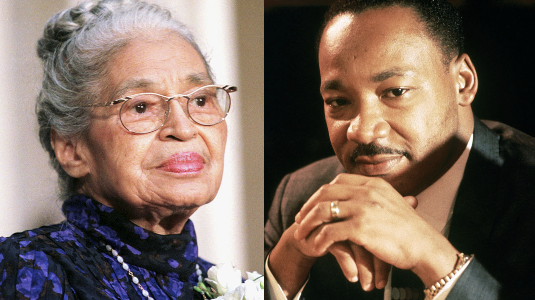The state of Alabama may consider dismissing the convictions of civil rights activists Rosa Parks and Dr. Martin Luther King Jr., nearly 70 years after they were arrested for violating segregation laws.
Parks, a seamstress, was accused of violating the racial segregation laws when she refused to give her bus seat up to a white man back in 1955. After being fined $10, she opted not to pay.
This resulted in the Montgomery Bus Boycott which King helped lead. He would later be fined $500 in 1956 of violating a law that banned boycotts, according to Associated Press.
King and Parks became a part of history for maintaining their stance against racial segregation, and would go on to be staples cemented in Black history. Despite their monumental contribution to history, their convictions were never cleared, according to Civil Rights Attorney Fred Gray. Gray, who represented both Parks and King, also served as an activist and preacher in Alabama.
“We might just decide to file a lawsuit on his behalf to have that record expunged,” Gray said of King's record, also noting the same for Parks and others.
A similar matter came from civil rights pioneer Claudette Colvin who requested clearance from her arrest records dating back to 1955, and a conviction for non-compliance of racial segregation laws. The civil rights activist had assaulted an officer during arrest and was cited as being unruly. After leaving Alabama to live in New York, Colvin never receive notice that her probation ended.
Nearly 70 years since Colvin protested racial segregation, much like her counterparts Parks and King, their convictions remain intact in Montgomery, Alabama. Bids, however, have been petitioned to erase both King and Parks’ past convictions.
Montgomery County DA Daryl Bailey serves as the chief prosecutor in Alabama’s capital. He said he supports expunging the arrest records, but would need more details before responding in court, NBC News reports.
At the time of filing her expungement request, Colvin said her " mindset was on freedom.”
Phillip Ensler, who represents Colvin, said he’s in support of any bid to erase court records of other activists that served during the civil rights movement. What makes Colvin’s case unique, in comparison to Parks and King, she assaulted an officer during her arrest and was unruly.
The city of Birmingham, Alabama offered pardons to protesters that were detained in 1963, however, many refused to accept.
Gina Ishman, a Montgomery County Circuit Clerk, explained that while expunging records does remove past arrests from defendants, it doesn’t terminate the paper trail.
